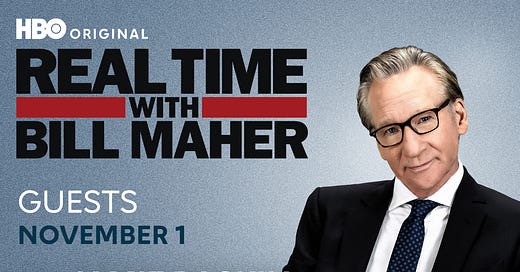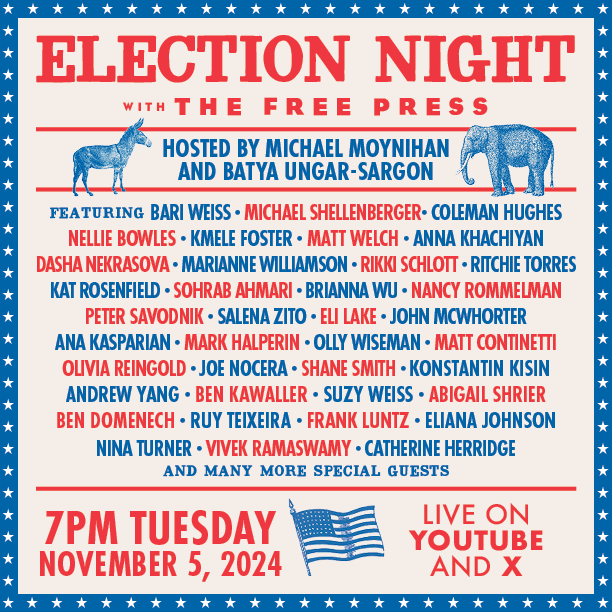Firehose #117: Last Maher Before the Apocalypse
Also: The long and unhappy death of the newspaper endorsement
Who’s got two middle fingers and is going tonight on the last Real Time With Bill Maher before the election? THIS guy! So to kick off what will be an appropriately long and impressively early final Firehose before C U Next Tuesday, let’s see what M.C. Moynihan has been up to during the final countdown….
* First, here ol’ Hollywood was one week ago looking straight into the Free Press camera to deconstruct overuse of the F-word:
* Next, here he was on Halloween/Kmele-birthday Thursday, Free Press-livestreaming with media empress Bari Weiss (veteran of Episodes #89, #115, #159, #180 & #187) and salt-miner Batya Ungar-Sargon (#451), as well as guests including Catherine Herridge and Coleman Hughes (#121, #144, #181, #188, #201, #379, #412 & #442), on such subjects as the IRS involvement with the Hunter Biden laptop story, the “Kinderfada Revolution,” Democratic skullduggeries in Puerto Rico, and more:
* The day before that he was on the same bat(ya) channel, talking prezzy election & media pratfalls:
* Finally, I don’t know if I’ll be able to get this link to playably embed, but … you can see that, as advertised, our election night party will be an absolute shitshow of competing livestreams, including our own (deets TK), with about 4,000 people from our broader universe crammed into two adjoining SoHo penthouses…. I predict pain.
* I talked about the economics behind the wave of newspaper non-endorsements in #477. Spelled it out at greater length this week at Reason; here’s how it ends:
When you combine political polarization with a collapsing business model, the loudest cost centers are going to be the first to go.
As with the decline of many local institutions, from church to Little League to social clubs, there is some unreplicable loss associated with the demise of editorial boards. Though definitionally insular (I tried in my small way to share our newsmaker conversations with the public), they served as a way for the local and sometimes national political class to check one another, deliver progress reports, argue ideas. When I spoke with the then-L.A. Times publisher in 2008 about potentially returning to run the page, and he wondered aloud—Michael Kinsley-style—about the value of continuing unsigned editorials, I blinked rather than reach for the axe. Like the canned peaches at town meetings in the classic HBO show Deadwood, there was some mystery in the civic ritual that I felt too conservative to toss aside.
But kiloliters of red ink have spilled since then. What you're hearing this week is the thrashing of an old whale yanked rudely from the sea and dumped unceremoniously onto the sand: It will be loud, not particularly dignified, and will soon die. Bezos and company managed all of this poorly—this decision should have been made in spring, not October—but as the last generation of non-vulture capitalists willing to bet on the newspaper business, they acknowledged what many journalists still cannot: Those glory days are over.
* More on the same theme from Substack visionquester Hamish McKenzie (#369):
It just doesn’t make much sense for a news organization in the year 2024 to look like the Post looks, with thousands of editorial and sales staff, a product that often comes across as New York Times Lite, an income stream that blends premium subscriptions with crappy digital ads, and a political positioning that adopts the “voice from nowhere” but whose staff is quite clearly (and vocally, on social media) aligned with a particular party. It’s an institution that is out of place and out of time—a railroad company in the age of the automobile; a paper company in the age of the touchscreen.
The media ecosystem is in crisis because social media has a mental illness and traditional media has a physical illness. Today’s dominant social media platforms might make us angry and dumb, but they have functioning business models and, with the exception of X, financial stability. Today’s largest traditional media companies have the opposite problem. They produce quality work, but, with the exception of the New York Times and a few others, their increasingly decrepit bodies can no longer support their own weight. Even with an owner whose pockets are as deep as the Mariana Trench, the Post cannot escape that illness. […]
In their search to restore trust in the media, one hopes that Bezos and co. stop defaulting to the old and start looking to the new. They should back the bold entrepreneurs who have a vision for the future of media that transcends a bygone era and lays infrastructure that makes sense for the AI age. Bezos has reportedly spent billions of dollars on Blue Origin’s efforts to change what’s possible in space. That money hasn’t gone to refitting old Soviet rockets. What if he took the same approach to the industry that is supposed to serve as the bedrock for democracy?
* Did you need moar video previewing the election? OK here’s a bunch, starting with Nick Gillespie (Special Dispatch #72 & #379) yakking with polling nerd Nate Silver for Open to Debate:
* Next, for those who enjoy self-identified libertarians arguing about which presidential candidate is least bad, Zach Weissmueller assembled for Reason’s Just Asking Questions videocast a panel of Dave Smith (pro-Trump), Jacob Grier (pro-Harris), and David Stockman (pro-despair):
* How about … our friend Noam Dworman going on the Live From America Podcast (which he somehow co-hosts?) with comedy producer Hatem Gabr, to talk with comedian guests Mendy Pellin and Lou Perez about “Trump at Madison Square Garden, the Jewish vote, and more….”?
* Or: Noam + Coleman Hughes: “We toss around the best arguments for and against the candidates and come to the conclusion we're not voting”:
* I recommended in #477 the meticulous and non-hysterical stylings of my longtime Reason colleague Jacob Sullum when it comes to controversial issues during Insane Season. As ever, Sullum works through enough evidence to allow you to reach a different conclusion, only more informed. Two recent examples, the first about Trump’s repeated threats to crack down on television companies for their content:
Trump’s confusion presents a familiar question that has become especially important in the lead-up to next week's presidential election. Should his frequently reiterated desire to punish his political enemies be dismissed as meaningless bluster, or does it reflect authoritarian impulses that should repel voters who values civil liberties and the rule of law? Whether you take Trump literally or seriously, the answer seems clear. […]
[T]he most notable thing about [the Trump vs. 60 Minutes dispute over the editing of its interview with Kamala Harris] was the response that Trump thought was appropriate. He claimed the editing, like MSNBC’s “ELECTION INTERFERENCE,” was “totally illegal,” meaning the FCC should “TAKE AWAY THE CBS LICENSE.”
Strictly speaking, there is no “CBS LICENSE.” CBS Entertainment, a division of Paramount Global, owns and operates 28 stations, 14 of which are part of the CBS network, which also includes more than 200 affiliates across the country that carry CBS programming. The implication of Trump’s demand, then, is that all of those stations should lose their broadcast licenses because he did not like the way that 60 Minutes edited its interview with Harris.
“It’s a very embarrassing moment for them,” Trump told conservative podcaster Dan Bongino on October 18. “But the media is not pressing it. You would think the media would be pressing it. And I go a step further. It’s so bad they should lose their license, and they should take ‘60 Minutes’ off the air.” […]
[T]he FCC as currently composed is clearly not inclined to take up this matter or Trump’s other complaints about allegedly biased news coverage. But [Chair Jessica] Rosenworcel’s term expires at the end of June 2025, meaning that Trump, if elected, would have a chance to appoint her replacement and designate a new chair. […]
Trump’s take on this admittedly baffling situation is nevertheless telling. He thinks federal regulators should have a say about anything that appears on TV, regardless of whether it actually involves “the public airwaves,” and he thinks they should use that imagined power to squelch content he identifies as “fake news” or “election interference.” As usual, what matters for Trump is whether people are saying “nasty” things about him, and he has no compunction about using state power to punish his critics. While his specific fantasy of doing that via the FCC may come to nought, I am not keen to find out what else he might try if voters give him the chance.
* Next, Sullum – who in 2020 wrote Reason’s “Case Against Biden” (I had the one against Trump) – uses the F-word dispute as an opportunity to wargame the potential power-exercises of Trump 2.0:
People who…support Trump this time around often argue that his illiberal tendencies did not amount to much during his first term. But things are different now in several important ways.
First, Trump has accumulated more grievances against the political opponents he blames for persecuting him. He has repeatedly threatened to punish those “enemies from within” if he regains power, whether through criminal investigations, revocation of broadcast licenses, or other routes of retribution.
Second, the U.S. Supreme Court has endorsed a broad version of presidential immunity from criminal liability for “official acts.” That license explicitly encompasses a president’s communications with the Justice Department, one of the chief ways that Trump could make life unpleasant for his critics.
Third, Trump during his first term was restrained by calmer voices that are unlikely to get a place at the table during a second term. To give you a sense of what that could mean, Boris Epshteyn, a lawyer who played a key role in Trump’s attempts to reverse the 2020 election results, is reportedly a contender for White House counsel.
Former Vice President Mike Pence, who resisted Trump’s pressure to intervene in the January 2021 tally of electoral votes, has rebuked his former boss for asking him to subvert the Constitution. By contrast, Pence’s replacement, Sen. J.D. Vance (R–Ohio), says he would have been happy to do Trump’s bidding.
* Also doing a deep/pessimistic forecast of a Trump victory this week is Yascha Mounk (#124, #195).
* Comment of the Week comes from Kathleen:
No one tell Kmele that Grandma said that to all the kids.
Walkoff music:






Bill Maher and the other TDS guest were so annoying! Why have Michael Moynihan on if you don’t want an actual intelligent discussion on how we got here? And no deep dive (or even a whisper) into a candidate whom I believe poses as much (maybe more?) of a threat than orange man because we can only assume she’s still as radical as she was in 2019 and she has the entire legacy media and and gov’t agencies doing her heavy lifting.
Thankful for 5th column, Reason, and the Free Press for being honest brokers and nuanced.
For all the ball breaking you guys got I am so grateful that you’re there NOT having a nervous breakdown, not clear why anyone would be served that, particularly the most distressed over the election, regardless of which direction their ire is coming from.
This is the place because you remind the audience that Wednesday will follow Tuesday, rather than destruction. The most unsettling times are when you guys are apprehensive, then I think it’s time to really worry. TBH I’m not convinced people lobbying for more hysterics would be pleased if they got their wish.
Thank you for the updates, have a great weekend, and C U Next Tuesday!